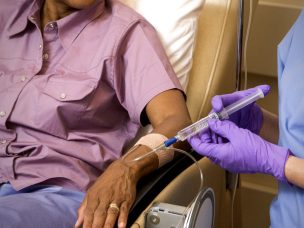Oncology
Adoptive T-Cell Therapy for Classic Hodgkin Lymphoma
An article published in Blood Advances reviewed past and ongoing clinical trials of adoptive immunotherapy for patients with classic Hodgkin lymphoma (cHL). The article also examined current challenges and strategies specific to improving the development of CAR T-cell therapy for cHL in general and relapsed or refractory cHL in particular. The authors gathered data from eight past...
Dr. Lee Greenberg: Why are Blacks More at Risk of Blood Cancer
Dr Lee Greenberg of the Lymphoma and Leukemia Society discuses health disparities among Black patients as it relates to blood cancers.
Insurance Status and Multiple Myeloma Survival Outcomes
Disparities in outcomes for patients with multiple myeloma have been linked to socioeconomic barriers. This study, published in Leukemia Research, aimed to provide further insight into the nature of these disparities to ensure equitable treatment. Specifically, the study focuses on the association between insurance status and survival in patients with multiple myeloma. This study relied...
Immigrants With Breast Cancer Face Diagnostic Disparities
Although health disparities are often studied with regard to race and ethnicity, there are also disparities present between native and foreign-born women. This study, published in Annals of Epidemiology, focused on the timing of breast cancer diagnosis for these two groups. The researchers hypothesized that immigrant women would be less likely to be diagnosed at a localized...
Black Patients With Breast Cancer Survive Less
The breast cancer mortality gap between Black and white patients can be attributed to many factors, including socioeconomic variables, tumor biology, and genomic architecture. Detailed analyses of this gap have been well-documented in the literature, but the effect size of race across different breast cancer subtypes and survival outcomes has not been studied at length....
Breast Cancer Management Delayed Due to Pandemic
The ongoing COVID-19 pandemic has disrupted cancer screening and treatment programs. This study, published in Current Breast Cancer Reports, focuses on the pandemic’s effect on African American and Hispanic-Latina Americans with breast cancer. The researchers found that African American and Hispanic-Latina patients have experienced disproportionately high morbidity and mortality from COVID-19. They stipulated that these findings...
Dr. Hadiyah-Nicole Green's Promising Cancer Research
In this MD Newsline exclusive interview with cancer researcher Dr. Hadiyah-Nicole Green, Ph.D., we discuss Dr. Green’s research on laser-activated nano-therapy in mice and its implications for cancer treatment in humans. We also discuss how the Ora Lee Smith Cancer Research Foundation is working to fund her future clinical trials in humans. MD Newsline: Can you...
Dr. Hadiyah-Nicole Green, Ph.D.: Diversifying Cancer Clinical Trials
In this MD Newsline exclusive interview with cancer researcher Dr. Hadiyah-Nicole Green, Ph.D., we discuss how to increase recruitment and enrollment of diverse groups in cancer clinical trials. MD Newsline: Dr. Hadiyah-Nicole Green, Ph.D.: “I think in order to improve and increase the recruitment and enrollment of diverse groups in clinical trials, it is important...
Why Black Americans Experience High Cancer Mortality
In this MD Newsline exclusive interview with cancer researcher Dr. Hadiyah-Nicole Green, Ph.D., we discuss cancer survival and cancer mortality among Black Americans. MD Newsline: Why do Black Americans have the highest death rate and shortest survival of any racial/ethnic group in the United States for most cancers? Dr. Hadiyah-Nicole Green, Ph.D.: “African Americans have...
More Medical News














